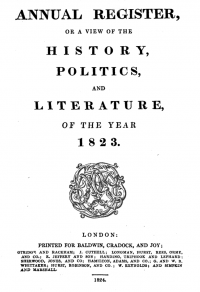Nothing much seems to have happened in 1823: no major disasters; no large-scale wars started or ended; no one particularly notable seems to have been born or died. Indeed 1823 seems to have gone out of its way to be an inconspicuous year for world changing events.
Perhaps this is why a death in a small Devon parish was reported, not only in newspapers all around the country and even in Ireland, but was also recorded in volume 65 of the “Annual Register”- subtitled A view of the History, Politics and Literature of the year 1823.
Whilst 1823 apparently passed quietly for much of the world, the same perhaps cannot be said for the occupants of the two neighbouring Devon parishes of East and West Worlington. On July 13th of that year Sarah Down, a poor single woman, was found drowned. We know this from the burial records for West Worlington:
July 15, 1823. “Downe, Sarah, East Worlington, singlewoman (found drowned).
This was indeed an unfortunate event but it is perhaps somewhat surprising that the death of this ill-fated, but rather insignificant character, would be considered important enough to be published in national and international publications. Why this was so we can only conjecture, but it was indeed reported widely at the time and because of this, whilst sadly we know only little about her life, we do know a great deal about Sarah Down’s death.Sarah was only 33 when she died and it was reported at that time that she was the girlfriend of John Radford, a twenty-four-year-old farm labourer from East Worlington. From the age of seven John had been apprenticed to a local farmer, Robert Westacott, who was one of the overseers of the poor in the parish[1]. At the time of her death Sarah was apparently pregnant with John’s child. As a farm labourer one can imagine that John Radford would not have had much money to spare and the news of Sarah’s pregnancy, and the idea of supporting Sarah who already had two children, may have been unwelcome.
Sarah was last seen with John Radford (who also went by the name John Bright) on the evening of Friday, the 11th of July. John was therefore the primary suspect for murdering Sarah and at certain times he seems to have admitted this, but when it came to trial at the Devon Assizes in Exeter later in the month, he pled not guilty. What follows is a report from the Exeter Flying Post, a local newspaper, that tells the tale in, as near as we can get, the words of the people who were there.
[1] Van der Kiste, John, Devon Murders (Sutton True Crime History) The History Press. Kindle Edition.






